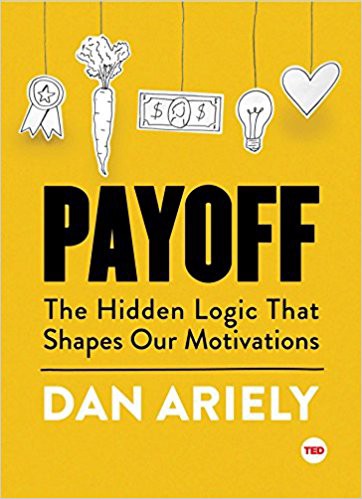For almost half of my adult life, I was running a not-for-profit venture with a team of unpaid volunteers in the suburbs of Mumbai. Yes, the social enterprise was successful in transforming few lives and won a few accolades, but running around in Mumbai’s heat to help a few strangers without any monetary gain would surely be tagged as ‘irrational’ behaviour by any economist.
A fool’s errand, was it then? Perhaps not, is what Dan Ariely would claim. The central hypothesis of ‘Payoff: The Hidden Logic That Shapes Our Motivations’ is that to have a life of meaning and to create an impact which lasts beyond our own lifespans, we undertake activities that are complex and hard, even if they are not positively correlated with financial gains.
As is the case in most social science books (psychology in particular), the author, a behavioural economist from Duke University tries to illustrate his theory through a mix of research work and personal anecdotes.
In a fascinating experiment, Ariely and his colleagues divided participants into two groups. Members of the first group — the builders, had to create origami figures and put a monetary value on them, and members of the other group — the buyers, only had the task of attaching value to the same origami figures, without contributing to the making process. The researchers found out that the builders valued the origami figures five times more than the buyers! This is what the author calls the IKEA effect, a cognitive bias in which people place a disproportionately high value on products that they partially create. To drive the point home even further, those participants in the builder group who were not given instructions to create the origami figures valued them at even a higher price point than those who followed the instructions, as ones without the instructions spent more time and effort to figure out how to build their origami creations. The effort put into the making the product was directly proportional to the satisfaction derived by the maker; each of subsequent units of work put in kept enhancing the idea of ‘self’ in the makers. In the most profound part of the book, Ariely mentions how the love for our kids is a result of the IKEA effect, the labours of parenting as challenging they may be are taken up by parents due to their physical, monetary and emotional investment in the children. The fact that the kids tend to share aesthetic features with the parents also enhances the powers of this effect.
Ariely also scoffs at the Adam’s Smith view of Industrial labour, “From this industrial-era point of view, capitalism and labour were based on a simple equation: individuals needed and wanted stuff; companies made and shipped the stuff people wanted; labourers worked at dismal jobs for long hours so they could buy stuff. Workers were assumed to view work as unpleasant, but the reward was assumed to be so important (a paycheck) that it was worth suffering through to achieve it and then exchange it for stuff.” According to him, the idea has endured the test of time, but I beg to differ. As an illustration, the Amazons and the Googles of this world do not follow this simplistic view of labour. Most of these technology goliaths provide comfortable seating, a quirky-fun work environment, food which would fulfils more needs than just sustenance and use catchphrases like ‘we’re going to change the world’ to signal to their employees that the work they’re doing is not only meaningful but the value it delivers would perhaps exceed their tenure at the organisation or even the duration of their lifetimes. Ariely mentions this himself when he talks about Zappos, the American e-retailer.
The ideas mentioned in the book can also provide some useful fodder to discuss the workings of political organisations. Political parties in India including the BJP and Congress, through strategies like nation-wide membership drives and campaign communications which showcase that they are likely to be the winning party (even before the actual elections) indicate to the voter that his or her vote would mean something, it would not go wasted and that instead of simply being a mere contributor to the eventual electoral success, he/she would very much be part of the victory.
This book does not offer any new insights for those of us who have already dived into the world of behavioural economics through Ariely’s previous books or even explored the work of Daniel Kahneman in his must-read magnum opus, ‘Thinking, Fast and Slow’. ’Payoff: The Hidden Logic That Shapes Our Motivations’ offers a relatively short and leisurely read for anyone who is interested in positively engaging another person to complete a task, but then as Ariely quips in the book “whatever our official job descriptions, we are all part-time motivators.”
Post Disclaimer
The opinions expressed in this essay are those of the authors. They do not purport to reflect the opinions or views of CCS.


